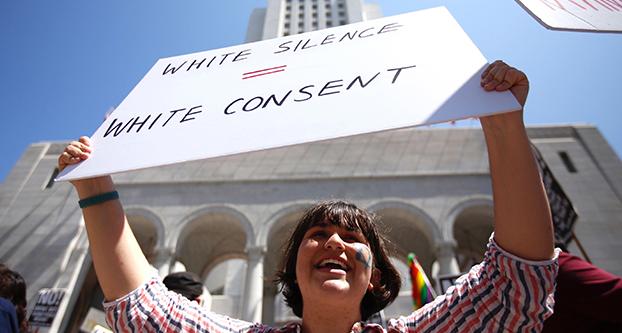It has been easy to throw low blows at the Donald Trump presidency. His tweets alone make it impossible not to refer to his last few months in office as a dumpster fire.
It takes little effort to jab at the ignorance of Trump’s public comments and persona. It has become knee-jerk to roll our eyes at one news story after another reporting another day spent at the golf course.
To most, his presidential campaign felt like a joke. We sat at dinner parties and told our friends there was absolutely no way he would win, that with Hillary Clinton’s charisma and experience she was a shoo-in, that Bernie Sanders’ was too big a revolutionary to win a popular vote.
We all knew that at least some of those things were part of a collective truth.
But we still somehow find ourselves here — seven months into a Trump presidency we were sure would never happen.
Earlier this month, white supremacists with Tiki torches marched through Charlottesville, Virginia in the name of nationalism. We waited with bated breath to see how Trump would handle this, especially because the people marching with Tiki torches were assumably the same people who voted for him last November.
Instead, we received a phoned-in press conference in which he attributed fault to many sides.
The country as we know it is crumbling. And as easy as it is to treat it as a joke, it’s real. This is bigger than late-night talk show hosts ruffling his hair on national television, or Alec Baldwin’s impersonation of him on “Saturday Night Live.”
Each day, we live in fear at the repercussions of a country led by Trump, a man who bullied his way into the White House.
People feel more emboldened than ever to express their hate.
Day after day, we see viral video after viral video of people telling those speaking in foreign language that they live in America and to speak English, that they cannot wait for those people to be deported, that they cannot wait until the wall is built.
It is naive to believe that these sorts of people have just begun to exist, that people are just learning how to hate — it is not a matter of newborn hate, just a matter of hate that is now fueled by the presidency of a racist and privileged white man.
People are feeling more powerful than ever in their expression of xenophobia, sexism and racism.
So how do we fix this? Where does the solution lie?
Until Trump is impeached, there is no real solution. In fact, even after he is impeached, there may still be no real solution for the damage that has already been done.
But there are things we can actively do in the meantime to curb the hateful and self-serving interests of the Trump Administration.
5calls.org encourages actively engaging with local representatives and voicing concerns that affect us both nationally and in our communities. The organization’s website provides scripts and uses your location to find representatives in your area, making the idea of engaging with local government less intimidating than those have found it to be in the past.
Grabyourwallet.org is also a valuable resource for those who don’t wish to financially patronize supporters of Trump or those affiliated with Trump. If you are financially able to, the website offers a master list of companies affiliated with Trump and what exactly that affiliation is, acting as a means to stop indirectly financing Trump, his family and those affiliated with his problematic presidency.
The last and — possibly most important — way to defend ourselves from a presidency such as this is to consistently educate ourselves on issues such as privilege as a means to help those who are economically disadvantaged or experience racism and prejudice.
With the voices of people of color being more suppressed than ever by fear or those in Charlottesville threatening their lives, white Americans must use their privilege as a means to educate themselves and others to aid voices of those being silenced.
Social justice is dangerous territory that requires consistently informing yourself on the happenings of the world and understanding that self-education is key.
It’s more than retweets or Facebook shares. It’s actively speaking out against hate, prejudice and injustice — it’s understanding that we must use our platforms to better educate ourselves and do more.
Because with each day, white silence becomes more and more deafening.




